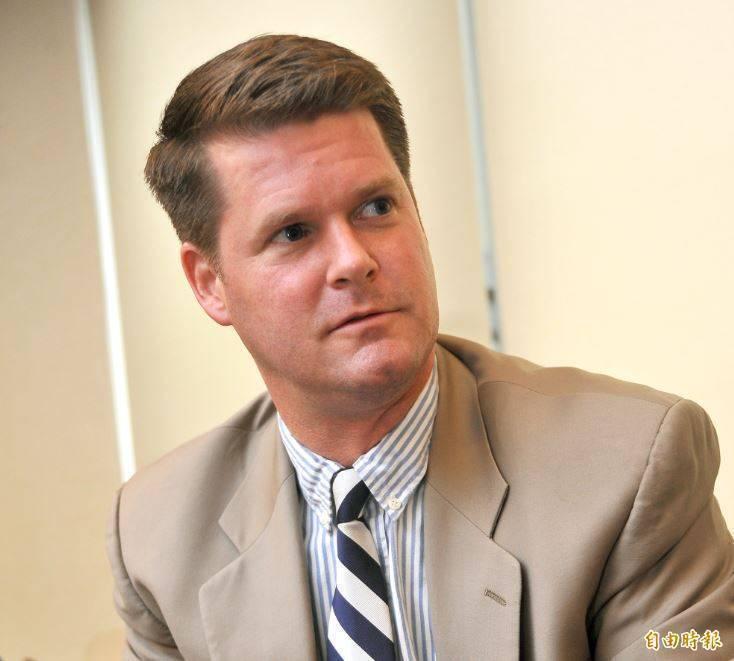Randall Schriver, former US assistant secretary of defense for Indo-Pacific security affairs, said yesterday that the US should "strengthen" its training of Taiwan's armed forces to help boost their combat readiness.
Schriver, who is now the chairman of the board of the American think tank Project 2049 Institute, made the comment during a US Senate Foreign Relations Committee hearing as a witness, when he was asked by Republican Senator Dave McCormick about his views on the US government's efforts to deter a cross-Taiwan Strait war.
In response, Schriver said it has been an evolutionary process, in which the US has become more direct in language and rhetoric on the issue.

Photo: Taipei Times file photo
In addition, the US has been moving into areas that were previously too sensitive, like the training of Taiwanese military forces, he said, adding that the US should enhance its initiatives in those areas.
"We need to strengthen our training of Taiwan military forces," Schriver said. "That was a taboo for decades, and now we're getting them to a point where they're more professional, more proficient, as they're placing a greater emphasis on training."
As part of the cross-strait war deterrence strategy, the US should also encourage Taiwan to consider adopting a more modernized command and control that would help optimize battlefield decisions, given the changing nature of warfare, he said.
"They need to look at a lot more unmanned, autonomous, and in every domain, including underwater," he said.
Schriver, who served as assistant secretary of defense for Indo-Pacific security affairs during US President Donald Trump's first term in office, also said that the US needs to help develop the Philippines, particularly Northern Luzon, given its proximity to the Taiwan Strait.
The US military has been helping to train Taiwan military forces for decades but has been doing so discreetly due to the sensitive nature of such actions.
In March last year, Taiwan's then-Defense Minister Chiu Kuo-cheng (邱國正) confirmed that US military personnel were being rotated to provide training to the armed forces in Taiwan, including conscripts, and Taiwanese soldiers were also receiving training in the US. He did not give any specifics for security reasons.
Yesterday's hearing in the US Senate was titled "Shared Threats: Indo-Pacific Alliances and Burden Sharing in Today's Geopolitical Environment."
Before the hearing began, Republican Senator Jim Risch, chairman of the Senate Foreign Relations Committee, said China's rising aggression in the Indo-Pacific region should be confronted, "but America should not be the world's only watchdog."
"To counter Chinese aggression, we need our allies to work with us to ensure each of us is strong and capable of pushing back," he said, calling for the allies to "expand US basing and overflight access" around the Indo-Pacific.
"The best way to show China that we stand together is if we are physically present in the region," Risch said.

The manufacture of the remaining 28 M1A2T Abrams tanks Taiwan purchased from the US has recently been completed, and they are expected to be delivered within the next one to two months, a source said yesterday. The Ministry of National Defense is arranging cargo ships to transport the tanks to Taiwan as soon as possible, said the source, who is familiar with the matter. The estimated arrival time ranges from late this month to early next month, the source said. The 28 Abrams tanks make up the third and final batch of a total of 108 tanks, valued at about NT$40.5 billion

Two Taiwanese prosecutors were questioned by Chinese security personnel at their hotel during a trip to China’s Henan Province this month, the Mainland Affairs Council (MAC) said yesterday. The officers had personal information on the prosecutors, including “when they were assigned to their posts, their work locations and job titles,” MAC Deputy Minister and spokesman Liang Wen-chieh (梁文傑) said. On top of asking about their agencies and positions, the officers also questioned the prosecutors about the Cross-Strait Joint Crime-Fighting and Judicial Mutual Assistance Agreement, a pact that serves as the framework for Taiwan-China cooperation on combating crime and providing judicial assistance, Liang

A group from the Taiwanese Designers in Australia association yesterday represented Taiwan at the Midsumma Pride March in Melbourne. The march, held in the St. Kilda suburb, is the city’s largest LGBTQIA+ parade and the flagship event of the annual Midsumma Festival. It attracted more than 45,000 spectators who supported the 400 groups and 10,000 marchers that participated this year, the association said. Taiwanese Designers said they organized a team to march for Taiwan this year, joining politicians, government agencies, professionals and community organizations in showing support for LGBTQIA+ people and diverse communities. As the first country in Asia to legalize same-sex

MOTIVES QUESTIONED The PLA considers Xi’s policies toward Taiwan to be driven by personal considerations rather than military assessment, the Epoch Times reports Chinese President Xi Jinping’s (習近平) latest purge of the Chinese People’s Liberation Army (PLA) leadership might have been prompted by the military’s opposition to plans of invading Taiwan, the Epoch Times said. The Chinese military opposes waging war against Taiwan by a large consensus, putting it at odds with Xi’s vision, the Falun Gong-affiliated daily said in a report on Thursday, citing anonymous sources with insight into the PLA’s inner workings. The opposition is not the opinion of a few generals, but a widely shared view among the PLA cadre, the Epoch Times cited them as saying. “Chinese forces know full well that